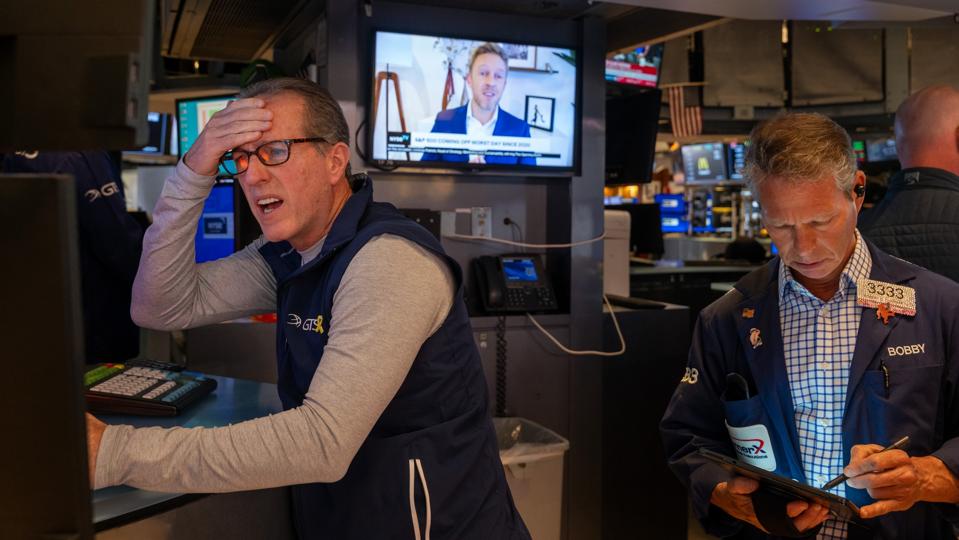Topline
Stocks globally plummeted again Monday as President Donald Trump dug in on his tariffs, which many economists predict will quickly send the global economy into a recession.
Key Facts
U.S. stocks sank even further Monday after historically bad Thursday and Friday trading which wiped out trillions of dollars in equity.
The Dow declined 870 points, or 2.3%, on the day by early afternoon, while the S&P and Nasdaq also declined 1.8% and 1.6%, respectively.
The midday losses were smaller than the dramatic drops at opening: The Dow Jones Industrial Average fell 1,320 points, or 3.4%, shortly after markets opened at 9:30 a.m. EDT, while the S&P 500 and tech-concentrated Nasdaq dropped 3.9% and 4.2%, respectively.
In a whirlwind session, all three indexes reversed to massive gains following a report the White House would pause the tariffs for 90 days — the S&P rose more than 6% from 9:45 a.m. to 10:15 a.m. — before again slipping as the Trump administration indicated it had no plans to do so.
The losses since prior to Trump’s “Liberation Day” announcement Wednesday are staggering: The Dow is down 11%, or almost 4,800 points and the S&P and Nasdaq are down 12% and 13%, respectively.
Wall Street warnings on the fallout of Trump’s 10% or greater tariffs accelerated, as Goldman Sachs economists said Sunday they now expect a recession if the White House maintains the announced tariff rates and Jamie Dimon, the billionaire head of the U.S.’ largest bank JPMorgan Chase, wrote to shareholders Monday the “recent tariffs will likely increase inflation.”
Trump Demands Fed Interest Rate Cuts
Trump’s first comments Monday showed no capitulation on tariffs, suggesting “the slow moving Fed should cut rates!” and falsely claiming “there is NO INFLATION.” He warned on his Truth Social platform: “Don’t be Weak!” Economists and policymakers widely agree inflation will worsen under Trump’s tariffs, and, even prior to the trade policy shift, inflation is still well above the Federal Reserve’s 2% goal. The historically politically independent Fed will conduct a closed-door meeting among its governing board Monday. Trump has not blinked at the stock market rout his policies initiated, even sharing a post Friday claiming he’s crashing the market “on purpose.”
Crucial Quote
“This is a manmade problem, concentrated really around one man,” Bhanu Baweja, UBS Investment Bank’s chief strategist, said in a call with media Monday, referring to Trump. “If that one person changes his mind, suddenly the whole algebra changes,” Baweja continued.
What Is A Bear Market?
A bear market occurs when a financial asset, most commonly a stock index, declines 20% or more from a recent high. Prior to the tariff stock meltdown, all three major U.S. indexes last entered bear market territory in 2022 as inflation raged at a four-decade high, causing the Federal Reserve to dramatically raise interest rates.
What Stocks Are Down The Most From Tariffs?
Already battered last week, big technology stocks tanked early Monday, as shares of iPhone maker Apple (down 6%) and Elon Musk’s Tesla (down 6%) struggled after dropping about 15% between Thursday and Friday. Also slumping were bank stocks, as shares of Goldman and Morgan Stanley dropped more than 2% each, building on double-digit slides last week.
S&p 500 Teeters On Verge Of Bear Market
The Nasdaq officially entered a bear market Friday, the S&P entered one Monday as it fell more than 20% below its February peak, while the Dow is not far behind, declining as much as 18% from its December all-time high. Following the whirlwind morning trading, the Dow is 17% below its record, the S&P 19% and the Nasdaq is 24%.
Japan’s Nikkei 225 Leads Global Stock Market Slide
Stocks tumbled in regular Europe and Asia trading Monday, as Europe’s Stoxx 600 and the U.K.’s FTSE 100 indexes tumbled 4% apiece and China’s CSI 300 and Japan’s Nikkei 225 indexes fell 7% and 8%, respectively.

